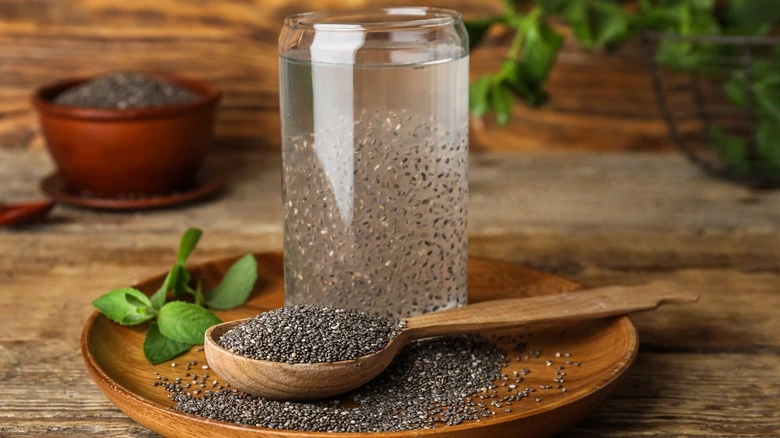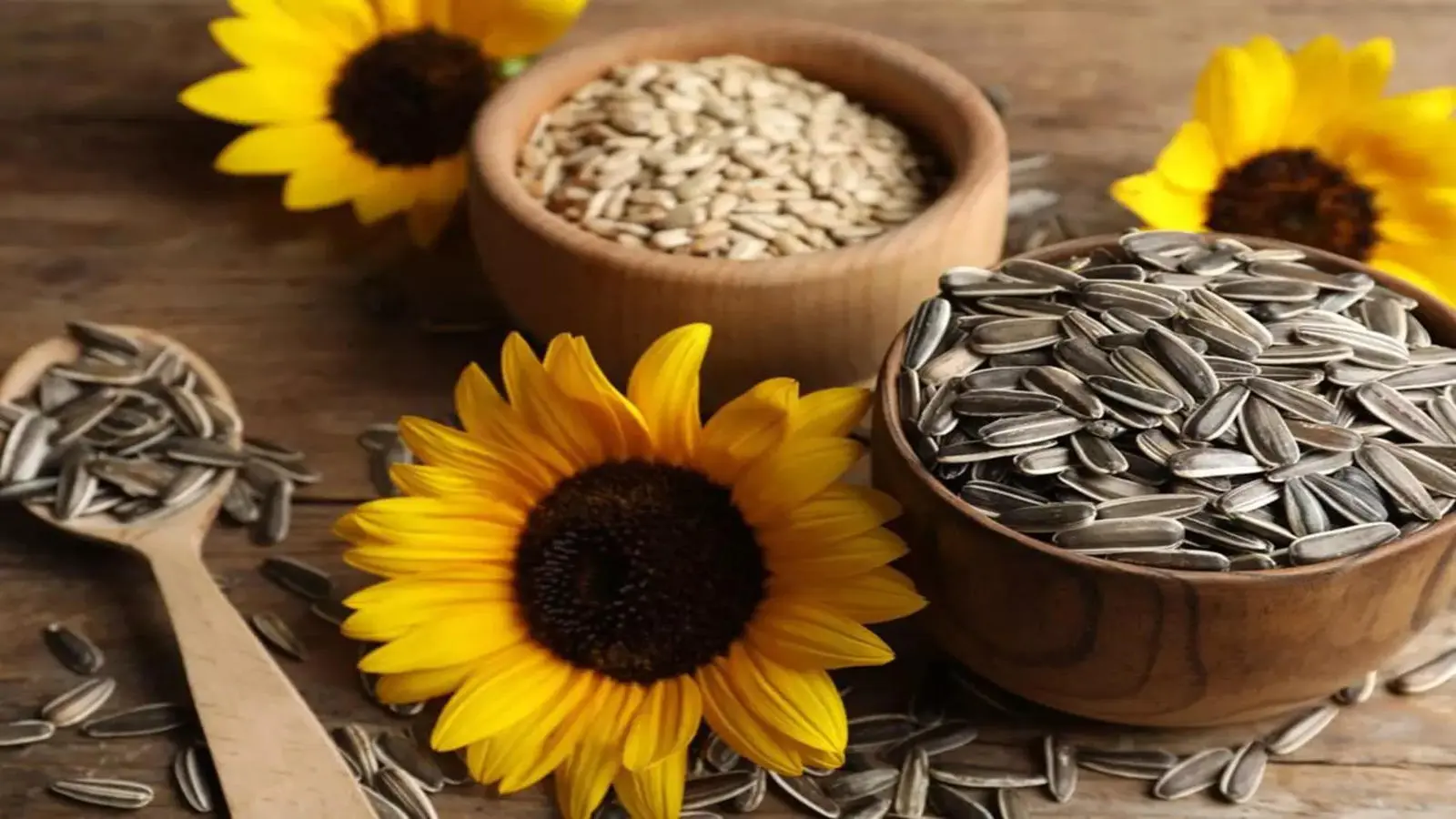Sunflower seeds may be small, but they are incredibly nutritious, Packed with essential vitamins, minerals, and antioxidants, a wide range of Health Benefits of Eating Sunflower Seeds. Let’s take a closer look at what makes sunflower seeds a nutritional powerhouse.
First and foremost, sunflower seeds are an excellent source of vitamin E, a powerful antioxidant that helps protect the body’s cells from damage caused by free radicals. Vitamin E also plays an important role in maintaining healthy skin, hair, and nails.
Additionally, sunflower seeds are rich in magnesium, which is essential for maintaining proper muscle and nerve function, regulating blood sugar levels, and supporting a healthy immune system. They also contain selenium, a mineral that acts as an antioxidant and plays a vital role in thyroid health.
“sunflower seeds are a good source of protein“, providing all the essential amino acids necessary for building and repairing tissues. They also contain healthy fats, including monounsaturated and polyunsaturated fats, which can help reduce inflammation and support heart health.
In terms of micronutrients, sunflower seeds are packed with important minerals like copper, manganese, and phosphorus. These minerals are involved in various bodily functions, including bone health, energy production, and the formation of connective tissues.
10 Health Benefits of Eating Sunflower Seeds
1. Heart Health Support
Sunflower seeds are a heart-healthy snack that can contribute to cardiovascular well-being. They contain:
- Healthy Fats: Including monounsaturated and polyunsaturated fats, which help reduce bad cholesterol (LDL) levels while increasing good cholesterol (HDL).
- Vitamin E: An antioxidant that helps prevent oxidative stress and inflammation, reducing the risk of heart disease.
- Magnesium: Helps regulate blood pressure and supports heart function.
Studies have shown that incorporating sunflower seeds into your diet can help lower blood pressure and cholesterol levels, promoting a healthier cardiovascular system.
2. Boosts Immune Function
The immune-boosting properties of sunflower seeds are largely attributed to their high content of.
- Vitamin E: Enhances immune cell function and protects against infections.
- Selenium: Plays a crucial role in the production of antioxidant enzymes that help defend against oxidative stress.
- Zinc: Essential for immune cell development and function.
Regular consumption of sunflower seeds can help strengthen the immune system, making it more effective at warding off illnesses and infections.
3. Supports Healthy Skin
Sunflower seeds are beneficial for skin health due to their rich content.
- Vitamin E: Provides protection against skin damage caused by free radicals, promoting a youthful complexion.
- Healthy Fats: Support skin hydration and elasticity.
- Copper: Helps with collagen production, which is crucial for skin structure and firmness.
Incorporating sunflower seeds into your diet can contribute to a healthy, glowing complexion and help prevent premature aging of the skin.
4. Enhances Digestive Health
The fiber content in sunflower seeds supports digestive health by.
- Promoting Regular Bowel Movements: Dietary fiber adds bulk to the stool, helping to prevent constipation and support regular bowel movements.
- Supporting Gut Health: Fiber helps maintain a healthy gut microbiome, promoting the growth of beneficial bacteria.
Eating sunflower seeds can contribute to improved digestion and overall gut health, reducing the risk of gastrointestinal issues.
5. Aids in Weight Management
Sunflower seeds can be a valuable part of a weight management plan due to their.
- Protein Content: Helps keep you feeling full and satisfied, reducing overall calorie intake.
- Healthy Fats: Provide satiety and help regulate hunger hormones.
Incorporating sunflower seeds into your diet can help control appetite and support healthy weight management by providing a satisfying and nutritious snack option.
6. Supports Bone Health
The combination of essential nutrients in sunflower seeds plays a significant role in maintaining strong bones.
- Magnesium: Supports bone formation and helps in the absorption of calcium.
- Phosphorus: Works with calcium to build and maintain bone structure.
- Copper: Plays a role in bone health by aiding in the formation of connective tissues.
Regular consumption of sunflower seeds can help improve bone density and strength, reducing the risk of osteoporosis and fractures.
7. Improves Mood and Cognitive Function
Sunflower seeds contain nutrients that support brain health and mood regulation, including.
- Vitamin B6: Plays a role in neurotransmitter function and mood regulation.
- Magnesium: Supports cognitive function and helps reduce symptoms of anxiety and depression.
- Tryptophan: An amino acid that contributes to the production of serotonin, enhancing mood and well-being.
Eating sunflower seeds regularly can support mental health, improve mood, and enhance cognitive function.
8. Regulates Blood Sugar Levels
Sunflower seeds can be beneficial for managing blood sugar levels due to their.
- Fiber Content: Helps slow the absorption of sugar in the bloodstream, preventing spikes in blood sugar levels.
- Magnesium: Plays a role in regulating insulin sensitivity and glucose metabolism.
Incorporating sunflower seeds into your diet can help stabilize blood sugar levels and may be beneficial for individuals with diabetes or those at risk of developing the condition.
Also Read| health benefits of eating pumpkin seeds
9. Supports Hormonal Balance
The nutrients in sunflower seeds contribute to hormonal health.
- Vitamin E: Supports hormone production and helps balance estrogen levels.
- Magnesium: Plays a role in regulating hormone function and reducing symptoms of premenstrual syndrome (PMS).
Sunflower seeds can help support hormonal balance, potentially alleviating symptoms associated with hormonal imbalances and supporting overall endocrine health.
10. Nutrient-Rich Profile
Sunflower seeds are packed with essential nutrients that contribute to overall health. A small serving of sunflower seeds provides a substantial amount of:
- Vitamin E: A potent antioxidant that helps protect cells from oxidative damage and supports skin health.
- Magnesium: Crucial for over 300 biochemical reactions in the body, including muscle function and energy production.
- Selenium: A trace mineral with antioxidant properties that supports immune function and thyroid health.
- Copper: Important for red blood cell formation and iron absorption.
These nutrients play a vital role in maintaining various bodily functions and supporting overall health.












